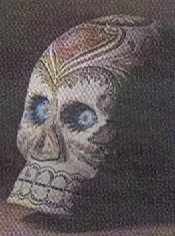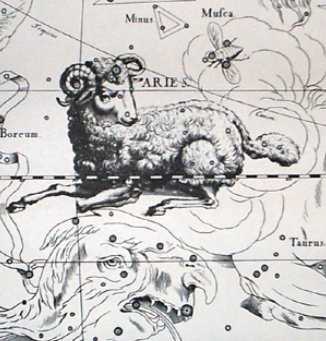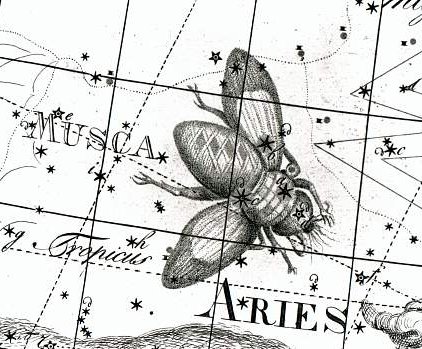I have named
the death
skull type
of glyph
gagana,
because once
Metoro
said so, and
Ngangana
was the 8th
son of Tu:
 |
| Eb6-24 |
| e gagana |
| Gaga
Exhausted, strengthless, to faint. Vanaga. To faint, to fall in a swoon, death struggle. Gagata, crowd, multitude, people, population. Churchill.
Mgv.: A bird. Mq.: kaka, id. Churchill. Pau.: Gagahere, herbs, grass. Ta.: aaihere, herbs, bush. Ma.: ngahere, forest. Pau.: Gagaoa, confused noise. Ta.: aaoaoa, noise of a rising assembly. Churchill. |
| ... the progeny of Tu increased: Rongo, Tane, Tangaroa, Rongomai, Kahukura, Tiki, Uru, Ngangana, Io, Iorangi, Waiorangi, Tahu, Moko, Maroro, Wakehau, Tiki, Toi, Rauru, Whatonga - these were the sons ... (Moriori myth of creation accoding to Legends of the South Seas) |

Let's
move
on.
Beyond
the
8th
and
final
of
the dark
nights
there
was
a
bird
of
birth, positioned
438
(=
365
+
73) glyphs counted
from
the
beginning
of
side
a.
Counted
from
Ga3-14
(73),
which
may
have
been
alluding
to
March
14
(=
December
31 -
292),
the
distance
was
365:
 |
 |
 |
 |
 |
 |
 |
| Ga3-10 |
Ga3-11 |
Ga3-12 |
Ga3-13 |
Ga3-14 (73) |
Ga3-15 |
Ga3-16 |
| MAY 29 |
30 |
31 (151) |
JUNE 1 |
2 (*73) |
3 |
4 |
| no star listed (133) |
ζ Hydrae (134.1), ρ Cancri (134.2), ο Cancri (134.6) |
Acubens, Talitha Borealis (135.0), σ Cancri (135.2), ρ Ursa Majoris (135.6) |
ν Cancri (136.0), Talitha Australis (136.1), ω Hydrae (136.8) |
9h (137.0) |
no star listed (138) |
π Cancri (139.2), Miaplacidus (139.3), Tureis (139.8) |
| σ¹ Ursa Majoris (137.0), κ Cancri (137.3), τ Cancri (137.4), Alsuhail (137.5), σ² Ursa Majoris (137.6), τ Ursa Majoris (137.7), ξ Cancri (137.8) |
| August 1 |
2 |
3 |
4 (216) |
5 |
6 |
7 |
| 'July 5 |
6 (*107) |
7 |
8 |
9 (190) |
10 |
11 |
| SOLSTICE |
"June 22 |
23 |
ST JOHN'S EVE |
25 (*96) |
26 (177) |
27 |
| NAKSHATRA DATES: |
| NOVEMBER 28 |
29 (333) |
30 (*254) |
DECEMBER 1 |
2 |
3 |
4 |
| μ Aquarii (316.0) |
ε Equulei (317.8) |
no star listed (318) |
21h (319.6) |
χ Capricorni (320.0), ν Aquarii (320.3), γ Equulei (320.6), ο Pavonis (320.8) |
δ Equulei (321.7), φ Capricorni (321.8) |
Kitalpha (322.0), Alderamin (322.9) |
| Armus (319.0), Dorsum (319.3), Tsoo (319.7) |
| January 31 |
February 1 |
2 |
3 |
4 (400) |
5 (36) |
6 |
| 'January 4 |
5 (*290) |
6 |
7 (372) |
8 |
9 |
10 |
| SOLSTICE |
"December 22 |
23 (*277) |
CHRISTMAS EVE |
25 |
26 (360) |
27 |
| 352 |
 |
 |
 |
 |
| Gb7-18 |
Gb7-19 (200) |
Gb7-20 (430) |
Gb7-21 |
| FEBRUARY 5 (36) |
6 |
7 (403) |
8 (*324) |
| Ksora (20.1), ω Andromedae (20.6), γ Phoenicis (20.8) |
δ Phoenicis (21.5) |
υ Andromedae (22.9) |
Achernar (23.3), χ Andromedae (23.6), τ Andromedae (23.9) |
| April 10 (100) |
11 (466) |
12 |
4-13 |
| 3-14 (73) |
'March 15 |
16 (*360) |
17 |
| NAKSHATRA DATES: |
| AUGUST 7 |
8 (*140) |
9 |
10 (222) |
| 71 Virginis (203.6) |
no star listed (204) |
Heze (205.0), Southern Pinwheel Galaxy (205.7) |
ε Centauri (206.3), κ Oct. (206.4) |
| October 10 |
11 |
12 (285) |
13 |
| 'September 13 (256) |
14 (*177) |
15 |
16 |
 |
 |
 |
 |
 |
| Gb7-22 |
Gb7-23 (204) |
Gb7-24 |
Gb7-25 |
Gb7-26 (436) |
| FEBRUARY 9 |
10 |
11 (42) |
12 (408) |
13 (*329) |
| τ Ceti (24.7) |
no star listed (25) |
ANA-NIA |
Al Sharatain-1 / Ashvini-1 / Bond-16 / Mahrū-sha-rishu-ku-2 |
ι Arietis (28.0), λ Arietis (28.2), υ Ceti (28.8) |
| χ Ceti (26.1), POLARIS, Baten Kaitos (26.6), Metallah (26.9) |
Segin, Mesarthim, ψ Phoenicis (27.2), SHERATAN, φ Phoenicis (27.4) |
| April 14 |
15 |
16 (471) |
17 (107) |
18 (*393) |
| 'March 18 |
19 |
20 |
0h |
22 |
| NAKSHATRA DATES: |
| AUGUST 11 |
12 |
13 (*145) |
14 |
15 (227) |
| no star listed (207) |
τ Bootis (208.2), Benetnash (208.5), ν Centauri (208.7), μ Centauri, υ Bootis (208.8) |
no star listed (209) |
Muphrid (210.1), ζ Centauri (210.3) |
φ Centauri (211.0), υ¹ Centauri (211.1), υ² Centauri (211.8), τ Virginis (211.9) |
| October 14 |
15 |
16 |
17 (290) |
18 |
| 'September 17 (260) |
18 |
19 |
20 |
21 (*184) |
JUNE 2 was 73 days after MARCH 21 (0h). 73 + 73 = 146 (JUNE 2). In rongorongo times it was 137 days after 0h. 217 (August 5) - 64 = 153 (JUNE 2).
365 glyphs later it was FEBRUARY 15 (46), or in rongorongo times April 20 (46 + 64 = 110).
However, the distance from JUNE 2 (respectively August 5) to FEBRUARY 15 (respectively to April 20) = 46 + 365 - 146 = 265 (respectively 110 + 365 - 217 = 258 = 365 - 107). The number of glyphs are 100 (respectively 107) more than the number of days because I have changed the precessional time frame from 0h at Hyades II to 0h at Sirrah.
But for the moment I fail to see why our well known number 107 becomes 100 when the dates from Hyades II are used instead of the dates from the time of rongorongo. Anyhow, it may be an indication that we basically should read the glyphs with the perspective corresponding to the time of the Hyades II.
It was a birth at the Back of the Head of Ku, at Hamal (α Arietis), although Hevelius has the star squarely in the front of the head of the Sheep (resting upon the head of Cetus):

This triplet of glyphs was probably meant to refer back to the triplet 8 nights earlier:
 |
 |
 |
 |
4 |
| Gb7-18 |
Gb7-19 (200) |
Gb7-20 (430) |
Gb7-21 |
| FEBRUARY 5 (36) |
6 |
7 (403) |
8 (*324) |
| Ksora (20.1), ω Andromedae (20.6), γ Phoenicis (20.8) |
δ Phoenicis (21.5) |
υ Andromedae (22.9) |
Achernar (23.3), χ Andromedae (23.6), τ Andromedae (23.9) |
| April 10 (100) |
11 (466) |
12 |
4-13 |
| 3-14 (73) |
'March 15 |
16 (*360) |
17 |
From a state of generation in the dark underground there arrived a triplet of days announcing the new beginning - with eating, births, and light in the sky.
We can compare with the earlier presentation, which has a mauga 354 (= 12 * 29½) days after 0h at the time of Bharani:
 |
 |
 |
 |
| Gb4-1 |
Gb4-2 (93) |
Gb4-3 |
Gb4-4 (324) |
| FEBRUARY 5 (36) |
6 (*322) |
7 (403) |
8 |
| Ksora (20.1), ω Andromedae (20.6), γ Phoenicis (20.8) |
δ Phoenicis (21.5) |
υ Andromedae (22.9) |
Achernar (23.3), χ Andromedae (23.6), τ Andromedae (23.9) |
| April 10 (100) |
11 (466) |
12 |
13 |
| 3-14 |
'March 15 |
16 (*360) |
17 (441) |
| "February 28 |
"March 1 (60) |
2 |
3 (427) |
 |
 |
 |
 |
| Gb4-5 |
Gb4-6 |
Gb4-7 |
Gb4-8 (99) |
| FEBRUARY 9 (40) |
10 |
11 |
12 (408) |
| τ Ceti (24.7) |
no star listed (25) |
ANA-NIA |
Al Sharatain-1 / Ashvini-1 / Bond-16 / Mahrū-sha-rishu-ku-2 |
| χ Ceti (26.1), POLARIS, Baten Kaitos (26.6), Metallah (26.9) |
Segin, Mesarthim, ψ Phoenicis (27.2), SHERATAN, φ Phoenicis (27.4) |
| 4-14 |
April 15 |
16 |
17 (107) |
| 'March 18 |
19 (78) |
20 (*364) |
0h |
| "March 4 |
5 (64) |
6 (*350) |
7 |
Clearly the precessional time frame of Bharani could have been used here. The cut off wing in Gb4-5 was probably a sign of this - a sign of how the old one must be truncated in order to release his spirit, to enable his spirit to migrate into the new one, cfr Aa8-26:
| 59 |
 |
 |
519 |
 |
752 |
 |
| Ab1-1 |
Ab1-2 |
Ab7-26 |
Aa8-26 |
| 580 = 20 * 29 |
754 = 26 * 29 |
| 1334 = 46 * 29 |

 |
364 |
 |
106 |
| Gb7-22 (432) |
Gb4-5 (472 + 325) |
| FEBRUARY 9 (40) |
FEBRUARY 9 (40) |
| April 14 (4-14) |
April 14 (4-14) |
| 472 |
The regenerative force of flies may have motivated the ure signs. Such were not used in the text until the end of side a, beginning at OCTOBER 27 (300):
 |
 |
 |
 |
 |
 |
| Ga8-16 |
Ga8-17 (220) |
Ga8-18 |
Ga8-19 |
Ga8-20 |
Ga8-21 |
| OCTOBER 26 |
27 (300) |
28 |
29 |
30 |
31 |
| ζ Pavonis (283.4), λ Cor. Austr. (283.6), Double Double (283.7), ζ Lyrae (283.8) |
South Dipper-8 |
Sheliak, ν Lyrae (285.1), λ Pavonis (285.7) |
Ain al Rami (286.2), δ Lyrae (286.3), κ Pavonis (286.5), Alya (286.6) |
ξ Sagittarii (287.1), ω Pavonis (287.3), ε Aquilae, ε Cor. Austr., Sulaphat (287.4), λ Lyrae (287.7), Ascella, Bered (Ant.) (287.9) |
Al Na'ām-18 / Uttara Ashadha-21 |
| Φ SAGITTARII (284.0), μ Cor. Austr. (284.6), η Cor. Austr., θ Pavonis (284.8) |
NUNKI (288.4), ζ Cor. Austr. (288.5), Manubrium (288.8), ζ Aquilae (288.9) |
| December 29 |
30 (364) |
31 |
January 1 |
2 |
3 |
| NAKSHATRA DATES: |
| APRIL 27 (482) |
28 |
29 |
30 (120) |
MAY 1 |
2 |
| SIRIUS (101.2), ψ5 Aurigae (101.4), ν Gemini (101.6), ψ6 Aurigae (101.7) |
τ Puppis (102.2), ψ7 Aurigae (102.4) |
θ Gemini (103.0), ψ8 Aurigae (103.2), Alhena (103.8), ψ9 Aurigae (103.9) |
Adara (104.8) |
ω Gemini (105.4), Alzirr (105.7), Muliphein, Mekbuda (105.8) |
7h (106.5) |
| no star listed (106) |
| June 30 |
July 1 (182) |
2 (548) |
3 |
4 |
5 |
... From a religious point of view, the high regard for flies, whose increase or reduction causes a similar increase or reduction in the size of the human population, is interesting, even more so because swarms of flies are often a real nuisance on Easter Island, something most visitors have commented on in vivid language. The explanation seems to be that there is a parallel relationship between flies and human souls, in this case, the souls of the unborn. There is a widespread belief throughout Polynesia that insects are the embodiment of numinous beings, such as gods or the spirits of the dead, and this concept extends into Southeast Asia, where insects are seen as the embodiment of the soul ...
|



















